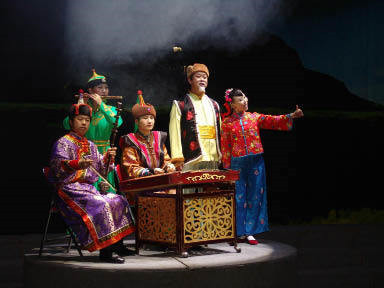 |
|
Manhan folksongs from 200 years ago are popular among both the Han and Mongolian peoples. |
Heard all over China
When our reporter reached Qifulin for a phone interview, he was tending his land. "I have just returned from a performance outside the region and am now at work in my fields. I have more than half a hectare to sow this year," he said.
Since 1987 Qifulin has performed Manhan folksongs all over the country, and abroad too. He has appeared in such high-profile events as China Central Television's (CCTV) Spring Festival Gala and the CCTV Competition for Western China Folk Songs, as well as a world tour for indigenous singers.
He has proclaimed his name, and his voice has been heard from his hamlet in the grasslands to the Great Hall of the People in Beijing, from his village radio sender, to CCTV.
Qifulin first broke into the spotlight in 1987 when he won first prize with 99 Turns of the Yellow River at a young singers' contest in Zhunger Banner, an honor he scarcely expected as an amateur singer with no formal training.
He snapped up another first prize in 2000 for a farmers' team at a farmers vs. herders singing competition staged by a regional TV channel. His Planting Willows on the River Bank elicited thundering applause from the audience. Inner Mongolian TV afterwards offered him a job as a contract singer.
Higher Than Luciano Pavarotti
Instruction in Manhan folksongs is oral, with no scores or other written records. Qifulin, who is musically illiterate, has an astounding voice that sets him apart from other singers.
At a Beijing performance, the producer was so enthralled by his singing that he measured the pitch. The result was a High A. When the excited producer said: "You reached High A! Do you know Pavarotti?" Qifulin replied, at a loss: "What is High A? And who is Pavarotti?"
Lacking any vocal training, Qifulin can barely offer a lucid explanation of how his voice is produced. "I sing just the way I would if I were on the plateau. It feels as if the sound comes out of my mouth, soars to my forehead, then to the top of my head, before sinking into my belly. My entire body exerts itself to support it. I just sing with my real voice."
This is all Qifulin can say about his "technique." This is how he has sung for the past 40 years. And songs slip from his lips whenever a sight inspires him. When asked "What would life be like without songs?" he replies: "There is no life without song."